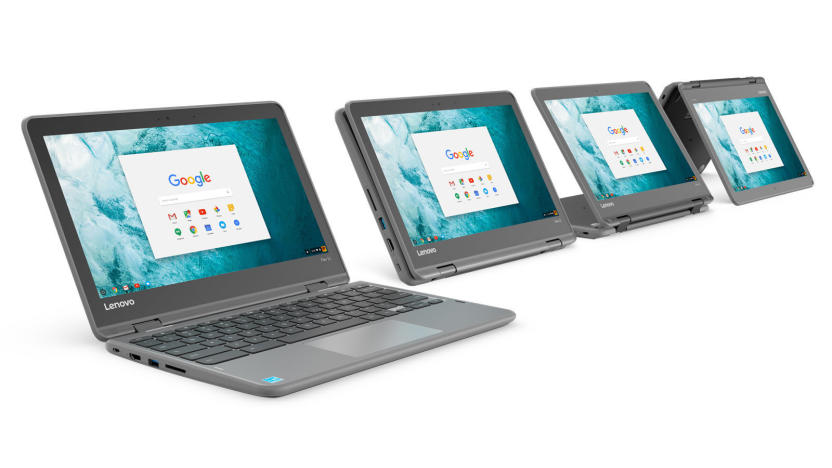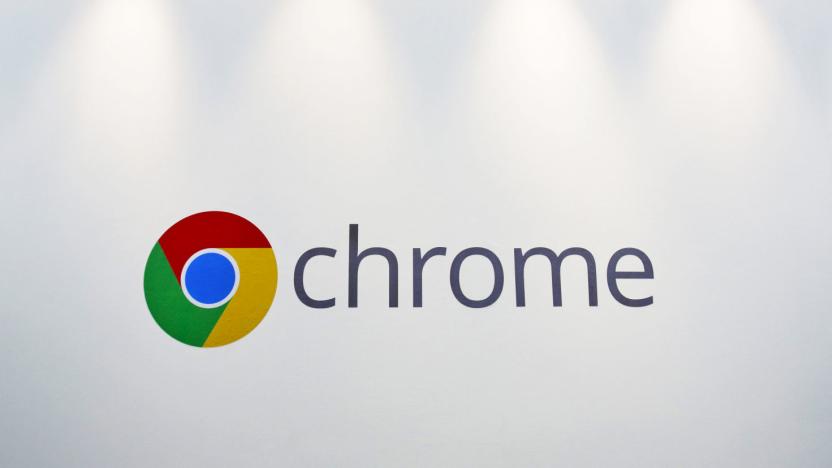chromeapps
Latest

Google reveals its timeline for killing off Chrome apps
Chrome apps have been on death row since Google announced in 2016 it would wind down support. Almost four years later, the company has finalized its timeline for phasing them out across Windows, Mac Linux and Chrome OS.

Google shuts down Chrome ‘apps’ section on Mac and Windows
Way back in August 2016, Google announced that it would be shuttering the apps section in the Chrome Web Store. As the company had stated in a blog post, this was one step in a process to shut down standalone Chrome Apps that nobody really downloaded from their browser anymore. Today Google followed through: Chrome browser users can no longer access or install apps from the Chrome Web Store.

Google is phasing out Chrome apps for Mac and Windows
Google's Chrome browser has supported stand-alone "apps" on Mac, Windows and Linux since about 2013, but they'll be going away before long. The company just announced that it will remove support for apps gradually over the next two years. The decision comes as part of an effort to simplify the Chrome browser -- Google just finished removing the app launcher on those platforms this summer -- and move developers to more standardized web apps. Apps will remain part of Chrome OS for the foreseeable future.

Mobile Chrome apps get improved notifications and sign-ins
Google's Chrome Apps for Mobile project has been handy for developers who want to repackage their websites as native apps for your phone, but the resulting projects have been limited in what they can do -- it's pretty obvious that they're recycled. As of now, though, they'll behave much more like apps built from the ground up for your Android and iOS devices. A new version of the project lets you provide your identity to these apps by signing in, and they can send you rich notifications with content previews, much like what you're used to on Android. There's also much better support for messaging and other services that need to talk to servers. Developers will have to build these features into their software before you'll notice the difference, but don't be surprised if the lines between native and web apps suddenly get very blurry.

Chrome apps may soon run without any trace of the web browser
Chrome web apps may behave like native software at times, but they still require some form of the Chrome browser to run -- even if it's just a basic process. They may not need that component for much longer, though. The Next Web has discovered a batch of experimental code for an "App Shell" that would include only those Chrome elements that are absolutely necessary. In theory, you'd get lightweight, browser-independent web apps that still have the advantages of native code. The company isn't saying whether or not its new technology will reach the public. Given Google's efforts to package web apps for mobile without requiring Chrome, however, it wouldn't be surprising if App Shell gets a formal release.

Chrome apps will soon arrive on Android and iOS devices
Last month, we discovered Google was working on a tool that would port Chrome apps to both Android and iOS. Today, the folks in Mountain View released a developer preview that does just that. Like the early rumblings suggested, it's based on open-source Apache Cordova, which leverages the software's native HTML, CSS and JavaScript. This means that the software will get wrapped in the stylings of a native app and can be submitted to each app store for distribution. There's also a slew of Chrome APIs available that you'd expect to see in mobile apps, including the ability to build in payments, notifications and alarms on top of those offered by the Cordova platform. Now that the tools are in the hands of devs, we'll have to bide our time until the finished Chrome apps begin to surface.

This Chromium experiment takes the URL out of the address bar, because why not?
Chromium, Google's open-source Chrome project, isn't for the average Joe (or Jane); it's for open-source fanatics. So today's two Chromium experiments, announced by Product Evangelist François Beaufort, should give that subset of users something curious and something useful to play with, in that order. First up is a Chrome OS experiment that mixes up the traditional URL-in-omnibox setup by removing the host URL altogether and placing it within the toolbar, just off to the right side (as pictured above). You can still click on that "origin chip" to display the full URL, as well as permissions data, if you'd like, but the the omnibox will remain empty for -- we're not sure -- a cleaner search experience, perhaps? Again, the reasoning behind this odd switch up is unclear, but knowing Google, it likely has to do with reducing clutter in the user interface as much as possible. The other, much more sensible experiment involves a bit of code that allows you to make any site of your choosing (presumably a favorite) into a Chrome App. The option, once enabled, will appear under Tools in Chrome's dropdown menu. All it requires is one click and you're done. And no, you wouldn't be wrong for thinking of this as a new way to bookmark sites... it is and it's simple to do. Just hit up the source below to get cracking on this Chrome customization and that other, weird one if you're so inclined.

Google creating a tool to port Chrome apps to Android and iOS
Google's been shepherding web applications to the desktop as packaged Chrome apps (think the browser-based Google Keep) for a while now, and it turns out the search titan is building a tool to help them go mobile. The Next Web noticed that Googler Michal Mocny has been hard at work on a project dubbed Mobile Chrome Apps that's been hosted on Github since May. The repository's description reveals the code is a toolkit for porting Chrome packaged apps to ones that will run on Android and iOS by using Apache Cordova (formerly known as PhoneGap). Though the applications will retain their HTML, CSS and Javascript innards, they'll look like native apps and can even be submitted to their respective app stores. While the software is publicly available, it's not expected to be in beta form until January. Ready to lunge into development anyway? Venture to the source and hack away.

Chrome apps gain native powers and desktop launcher on Windows and Chrome OS, Mac, Linux versions to follow
The line between native and web apps has been blurring more and more with the advent of HTML 5, and now Google's taking things even further with what it's calling a "new breed of Chrome apps." These new apps, while built with web technologies and the Chrome browser, appear and act like native apps. In fact, Google is rolling out a Chrome app launcher for Windows to allow users to launch these new apps directly from their desktop. Windows and Chrome OS users will get first crack at using these apps, with Mac (where it's currently available in the dev channel) and Linux folks getting them a bit later. To give these apps a native feel, Google has given devs a whole host of new tools. Apps work offline, can save data locally or in the cloud, provide desktop notifications and can connect with any device hooked into your computer via USB or Bluetooth -- meaning games can be designed to use external controllers. And, apps won't look tied to the browser as they won't be saddled with tabs, buttons, text boxes or any other browser-esque visual cues. The idea is to create Chrome apps that are nigh indistinguishable from their locally installed counterparts. For now, there are over 50 such apps available in the Chrome Web Store, with offerings including games, basic photo editing and task tracking apps, among others. However, we have a sneaking suspicion that Google's going to ensure that number grows exponentially in the near future.

TweetDeck for the web slips in expanded tweets and header photos
TweetDeck is Twitter's professional desktop client, though you might not always know it given that the app is sometimes out of step with its more pedestrian siblings. Today, Twitter is presenting a unified front in a more timely fashion. The web versions of TweetDeck now show the expanded tweets and header photos that reached the iPad and mobile apps a week ago. No major surprises are waiting in the wings save for the absence of a matching update to the native Mac and Windows apps -- hopefully, that's a gap that closes soon.

Chrome Web Store offers app recommendations from your Google+ mates, allows you to return the favor
Looking to your online pals for some Chrome Web Store suggestions? If so, the folks at Google have just made accessing said list of recommendations much easier. The outfit unveiled a new feature for the app repository that allows you to see all of the add-ons that your Google+ mates are raving about. You'll also be able to provide some tips of your own thanks to the addition of the trusty +1 button on the detail page of each offering. Just in case you forget to hit the "From Your Circles" link before browsing, each application will bear a stamp of approval -- should it be deemed worthy of the extra clicks. If you're short on acquaintances or are still new to the social network, the Chrome dev team's lists will appear for you as well.

Citrix app opens Windows for Chromebook owners
Google hasn't made any bones about its desire to position Chrome OS as a presence in the business space. But for plenty of users, the relatively limited functionality of Chromebooks doesn't quite get the job done when it comes to doing serious work. The latest offering from Citrix could change that for a number of Chromebook-sporting business-types, offering access to Windows applications and desktops. Citrix Receiver Tech Preview is free from the Chrome Web Store (but requires a MyCitrix login). So now there's no excuse for not getting any work done -- except maybe a bad connection.

appMobi XDK delivers free cross-platform dev environment to Chrome Web Store
The Chrome Web Store welcomed a new arrival today, and it goes by the name of appMobi XDK. While the addition is targeted squarely at developers, it's entirely free and packs quite a doozy -- cross-platform HTML5 software development from within the web browser. As you might expect, the tool is perfect for making applications to run within Google Chrome, but get this... it's also capable of creating native apps for submission to Apple's App Store and the Android Market. Like any competent development environment, it features a full set of debugging tools, along with the ability to test your apps via on-screen emulation and directly from your target device. Hardware integration is accomplished with JavaScript hardware abstraction, which enables access to the camera, GPS, accelerometer and the like. Further, the platform boasts full compatibility with PhoneGap, which means you can easily transition if you've got a project in the works. If you're already hooked, be sure to check out the PR after the break, which describes such goodies as in-app purchasing and secure user authentication, which are made possible with appMobi's cloud services.









